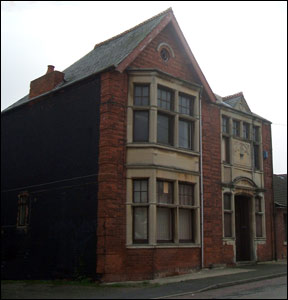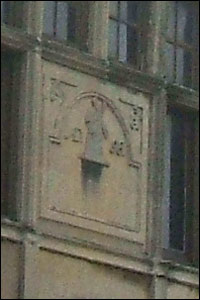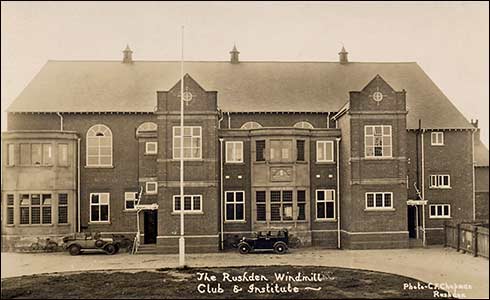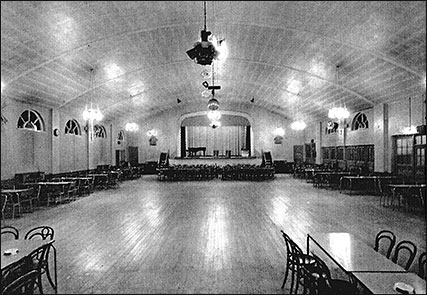|
||||||
| Rushden Echo, Friday 30th March 1928 |
||||||
|
Windmill Club
|
||||||
|
Opening of Club at Rushden
|
||||||
|
||||||
|
24th March 1928 One of the Finest Buildings in the County
On the occasion of the opening of the new club premises of the Rushden Windmill Club on Saturday the romantic beginning of the club–the first steward, Mr. Abbott, lent the money for the club officials to buy beer–was related. Everyone in the town is acquainted with the facts, already published, of the huge new building which the club has acquired at the cost of about £12,500 (including fittings and furniture), and the opening by Mr. B.T. Hall, national secretary of the Club and Institute Union, created much interest in the district. A large crowd was present to see Mr. Hall turn the key in the lock of the main door, a welcome to the national secretary being voiced by the club president, Mr. A.E. Haddon. Mr. Hall, "In the name of democracy and fraternity" – and he wished he could say liberty – declared the new premises open to the members.(Applause)
Mr. Haddon extended a hearty welcome to all members and affiliated members present. “I am sure,” he said, “this will be a red-letter day in the history of the club. I hope we shall make this new club a success. Alterations have been talked about for the past ten or twelve years, but until three years ago we could not see our way clear to get any alterations as suggested by the members. Now we have these fine new premises which reflect great credit on the old members of the club.” (Applause) Mr. Haddon said it was a long time since he had last seen their national secretary, Mr. Hall the last occasion being when he fetched him from Raunds to talk to hundreds of soldiers. That was a most interesting occasion, but he was sure it must give Mr. Hall greater pleasure to come down and open their new premises. In the old premises of the club conditions were such that AFFILIATED MEMBERS were driven away and they had not got sufficient accommodation. Now they could welcome affiliated members and extend to them the hand of friendship in the manner meant by club life.(Hear, hear.) "Some of the people get on about clubs" said Mr. Haddon, "but from my past experience of club life I cannot say that I regret joining. The noble work clubmen fulfil in every sphere of life throughout the length and breadth of the country is commendable, great credit is due to them from the educational standpoint." They had to look at the M.P.s and the benefits and education some of them received from club life. Then the members of the Urban District Councils, Parish Councils, and other public bodies showed that clubs were not so bad as they were painted. (Hear, hear.) The clubs possessed libraries with about 50 or 60 thousand books, which proved that education was spreading far amongst the masses of the working men though the club movement. He hoped that would spread in the future. Another good feature of club life was their convalescent homes, maintained by the club members. There could be nothing nicer for any member than to think that in times of affliction he could be sent to his own convalescent home and then come back and take up his life again among the other workers of the world. (Applause.) Mr. Bird read apologies from the Member for the Division (Mr. W. G. Cave), Wing-Commander A.W.H. James (prospective Conservative candidate), and Mr. W. Townley, J.P. of Northampton. The history of the beginning of the Windmill Club was related by Mr. Bird, who said that the first meeting at which the formation of a club was discussed was held at the house of Mr. C. Hodson in Brookfield-road. It was the first club formed in the district. The first club was built on a heap of stones where the old club now stands. The first steward of the club, a Mr. Abbott, lent the money for the club to buy its first supplies of beer. Interesting figures were presented by Mr. Bird, who said that in 1900 the mortgage on the club was £150, this being paid off in 1919. In 1920 the field on which the new premise stands was bought, as were the two houses near the old club. In 1918 the club brought War Stock amounting to £200. In 1923 £800 of War Stock was bought, and in 1924 another £1000 worth was bought making the total £2000. The balance of assets over liabilities in 1902 was £200, at present it was £6000. The present building cost about £12,500, including fittings. That shows that the committee were well up to their business and could easily hold their own. (Hear, hear) They should be able to repay all the money they had borrowed for the new premises in about 15 years. (Applause) Then they would have a place worthy of any club, and when they realised that it STARTED FROM A HEAP OF STONES and was now one of the finest buildings in the county they would agree that progress had been made. He would like to see the older members encourage the younger men to join the club. There were rooms where no drink was allowed, they had an excellent billiard-room and reading-room, and he was sure they could make the new club a great success. (Hear, hear) Mr. J. Hornsby thanked the committee of the club for inviting the Council to send representatives to that opening ceremony. It certainly gave him very great pleasure to be there. He had had the pleasure of going round the club, and he must say that it reflected very great credit on the management of the club, and also the architect, the builders, and the workmen, who had all carried out their work so splendidly. (Hear, hear) "I take it that the men of this club are men of vision," said Mr. Hornsby, "or they would never have launched out in such a magnificent building as they have. There is no doubt you are looking well into the future, and rightly so, for Rushden is going to continue to grow and prosper. We as a council are continuing extended building operations on this side of the town, and as far as one can say we shall have to consider continuing for some time until we have meet the growing demand for houses in Rushden. Of course you will require a fairly large membership to keep this club going, and I am pleased to see you have a magnificent billiards-room, a fine skittles alley, and a reading-room. Last but not least, you have this magnificent concert hall, which I think everyone is correct in saying is the best building in town. (Hear, hear) I wish you every success. Personally I take very little intoxicants, but I think that a person that likes a glass of beer has a perfect right to it. (Hear, hear) It would be a shame to debar one if they felt they enjoyed it and that it was doing them good. There are other sides of club life. You have facilities for recreation here, and when you have done your work in the factory you want to turn to THE SOCIAL SIDE OF LIFE, to try to get such enjoyment out of life as it is possible to get. This life is short. We do not want to make one another miserable, but to extend the hand of friendship one to the other, that we may receive all the enjoyment possible. I am certain that in trying to render social services to the people one gets more enjoyment out of life than by taking a narrow selfish view." Mr. Hornsby said that the old windmill from which the club took its name had fallen into decay from want of use, but he was inclined to think that that institute would not do the same. They wanted to extend as far as possible the social life of the district, and they wanted to keep the wheels turning in order to keep that institute going. “I am delighted to be present, and I wish you every success,” concluded Mr. Hornsby, amidst applause. Mr. Winfrey expressed pleasure at being in such a magnificent club. At one time he thought he would be in Moscow on that day, and not in Rushden. Owing to the difficulties with his passport, however, he was in Rushden. They had heard the history of the old club and how successful it had been. The committee had controlled the finances of the club in a most excellent way, and the opening of those premises marked the beginning of a new era in club life in Rushden. Fifty years ago they had a mortgage of £200; that had been paid off and the new building was more than half paid for. That was a matter on which the committee deserved everybody’s congratulations. "Club life is a most important feature of the national life to-day," said Mr. Winfrey. "The chairman of the Urban Council has spoken of the benefits of meeting together for social pleasure after a hard day’s work. What could be better after a hard day’s work than for a man to feel that he has a club to go to to enjoy recreation provided for him, to refresh himself in body if he so desires. I am very fond of a glass of beer, and hope the opportunity will often occur when I can have my refreshment here or at other clubs’ premises in the Division. (Hear, hear) There is one thing to bear in mind, and that is that a club saves a man going to a public house and being more or less compelled to continue to drink when he has no desire to do so. Club life exists for putting forward THE HAND OF FRIENDSHIP, and that is another way of saying 'Brother'. I am delighted to be here. I hope that in the near future you will be free of your obligations and that the club life of Rushden will go forward by leaps and bounds." Mr. Hall said he liked to think he was there as the representative of many others beside himself. When the Windmill club first came into association with the National Union in 1897 there were 600 clubs in the Union and about 180,000 members. Today there were 2,600 clubs and over a million members.(Applause) On behalf of those he offered them congratulations and wished them greater success in the future. “At the risk of repetition. I offer my congratulations to the architect. Sometimes one has to congratulate the architect on his skill in proving what he can do in a little space. Mr. Preston has not been handicapped as far as space is concerned, and I congratulate him on his conception of lofty rooms and the light in them. (Applause) Lightness and brightness and bright colours make the character of the individual in the club. Character is made more by environment than by all the speeches from platform and pulpit. Take most refined men and women and put them to live in the sordid grey, and grinding life some of the people of the City of London live, and in a short time these people would be less cultured and a little more accustomed to sordid and grey things. Take a man away from things sordid, poor, and mean and get him used to things bright and beautiful, and you have raised the standard of life and set him on the path of progress which the democracy of this country ought to travel. The people of this country will never realise the dreams of reformers until they are dissatisfied with poor things and anxious for better things. And the way to make them dissatisfied is to make them used to bright and beautiful things. Your club is doing that.” He could remember Mr. Winfrey, in his (Mr. Hall’s) Radical days, when they were both members of the same club. One year they raised their voices to ask for improvements in the club in the seating accommodation. They were told that the working men did not want to live like Lord Mayors. (Laughter) They were accused for going over to Toryism because they wanted the working men to be comfortable. The working class was as entitled to comfort as any Lord Mayor. He had often expressed the wish that on going into a strange village- and he must correct the chairman of the Council that RUSHDEN WAS A VILLAGE and not a town (laughter); at least, he was always told so at Higham Ferrers, (renewed laughter) – when a stranger came to a building which dominated the rest of the village and was the most handsome, he could be sure that it was a club for working men. (Hear, hear.) The movement was steadily spreading, and Rushden was moving as rapidly as other districts. “ I look forward to the time when the great mansions shall be turned into working men’s clubs and the great castles turned into convalescent homes” said Mr. Hall. “ It could be out of place to talk politics here but it seems astonishing that an institution of this kind which seeks to bring a larger measure of joy to the life of clubmen, has any critics and opponents at all. The only criticism arises because we are not teetotallers. I am glad to find I am not the only person on the platform who is fond of a glass of beer. It is undoubtedly true that the fact that we are not teetotal at the dictates of other people is the cause of criticism and a good deal of political animosity against working-men’s clubs. Therefore I appeal to you to make the Club Union as competent as possible for the defence of the clubs. The Union is entirely non-political, but it is ready to defend the clubs. If the Union should call upon the voting strength of the club movement, I hope that all you members will record your votes in support.” In conclusion, Mr. Hall urged the members and committee to greater success and accomplishments in the future. The history the secretary had given proved that they were ambitious. He formally declared those premises open to the members and affiliated members. (Applause) The visitors were entertained to tea in the reading-room after the opening ceremony, when further speeches were made. "The Architect and Builders" was the toast proposed by Mr. W. Wheeler, who congratulated Mr. Preston and Messes. W. Packwood and Son on the building of those magnificent premises. Everything the club members could desire was there. The committee were to be complemented on the fact that all the furnishings was done with a view to keeping to a minimum the dust nuisance. It was a club to be proud of, Mr. Preston as architect had excelled himself, and Messrs. Packwood in the building had done likewise. Mr. Preston expressed appreciation of the kind words spoken of him. In the planning of the club he had taken every care to make it as convenient as possible. He was indebted to the committee for the assistance they had given him in the work. The architect depended a great deal upon the contractor, and he would like to thank Messrs. Packwood for the able way they had carried out their work. Mr. W. Packwood, jun., responded on behalf of his firm, saying that the relations between the committee and his firm had always been of the best. He hoped it would not be long before they had to extend the building. (Laughter) Mr. J. Martin (vice-president) proposed "The Visitors." He said that the new premises were not only A CREDIT TO THE TOWN but to the club movement generally. There were other good clubs in Rushden, and he was pleased to say that there was a good fellowship amongst them all. Response was made by Mr. O.A.H. Muxlow, who said that as the manager of the local branch of the club’s bank he would like to pay a public tribute to the business ability of the president, secretary, treasurer, and committee. It required a good deal of courage to raise £10,000 but even that would not be the end of it. As manager of a bank he wanted the working man to know that he always got as much consideration at the bank as the rich man. Banks were not only for the big people. Therefore he had been particularly anxious in the negotiations to give every help possible to the club. (Applause) The toast of "Success to the Windmill Club" was entrusted to Mr. G. Luck, of Desborough. They at Desborough had been somewhat boastful for a few years, he said; but now they were jealous, but not selfishly so. "I have been associated with Mr. Haddon and Mr. Bird for many years, and I wish to say to them and to the members that they ought to be proud to be in such premises, which are the finest in Northamptonshire and almost in the Midlands. I have been all over the Midlands, and if this Club is not first it is second to none. I have noted with interest the club life of Rushden for many years. From many standpoints, it has been very encouraging. I refer to the work being done for THE BLIND AND THE CRIPPLED CHILDREN. (Applause) I believe I am right in saying that this work was largely started and has since been carried on by the members of the Windmill Club and other clubs in Rushden. This work appeals to me more than anything. The educational work in connection with the clubs in Rushden must be a great inspiration to club men throughout the length and breadth of England. I wish you every success in your new sphere of life." (Applause) Mr. Haddon responded. In connection with the work for the blind and the crippled children he mentioned that the splendid sum of £4,000 had been expended which he said reflected great credit upon the club committee that managed the fund. (Hear, hear) "The Town and Trade of Rushden" was proposed by Mr. A. Butt of Wellingborough, who said that as the people of Rushden were so progressive, trade must be in a very healthy condition indeed. One thing occurred to him as he was looking round the building, and that was that there was a certain change of outlook in the country. Clubs which had been springing up showed very clearly that changed outlook. At one time whatever refreshment they wanted they had to get at a public house. The brewers had taken advantage of that and spent millions of pounds in buying public-houses so they could dictate to the landlords what they should sell and dictate to the people what they should drink. However the people had taken the business in their own hands and had built those places, and had even started to be their own brewers. To make those new premises a success it was essential that all the members should work together in harmony. In order that the people should be happy, it was essential that trade should be good, and he hoped that the trade of Rushden would continue to prosper as it had done in the past. (Applause) Mr. F. Corby responded, and said that trade in the town during the past six months had been exceptional. He said: "I know there are VERY FEW UNEMPLOYED in connection with the trade, and I have heard it said that the factories are running the maximum quantities through. Personally I have always felt that in Rushden we shall have such trade, because we have in our manufacturers very able and capable men. I have had a long experience of the leather trade-which is a contemporary trade-and I hope in the next six months employment will be as good. I am very pleased I have been invited here. I was rather curious to know what sort of place you had got. I expected it was a grand place. It is very interesting to know that workmen can combine and take on an obligation. You are optimists as far as your future is concerned. The only club I have ever belonged to was a sick benefit club, which is very much different to this. I was interested to know that you have a membership of 700 or more. I have been looking round, and I see the provision you have made for the recreational side of the club, and I hope you will develop the ground outside for outdoor recreation and that you will cultivate the educational side. The work you are doing in connection with the blind and crippled children is an excellent and great work." That building, said Mr. Corby, was in line with other developments of the town. A characteristic of the town was that they were prepared to go the whole way. It was well that they had kept the name of the Windmill Club, because they were on the site of the old windmill. When he was a boy there were only three houses along Wellingborough-road, and it was not developed at all. There was a house at the bottom of the hill, near the present Adult School, a house where Mrs. Willmott lives, and the house connected with the old windmill. The developments that had taken place were really astonishing. The old mill became of no further use: more modern methods were found. In its day it had served the community. They could say that of their club-that they were fulfilling a service, even as the old mill had served the community. (Hear, hear) They could not have a greater aim than that of service. (Applause) Mr. F. C. Bird proposed "The Caterers", Mr. G. Dunmore seconded, and Mr. Morbey responded. The toast of "The Press" was submitted by Mr. Wheeler, response being made. In the evening the dance hall of the club was the scene of a grand opening dance, over 500 being present. Mr. F. Shellard was the M.C., and Annies’ Dance Band played the music. |
||||||



